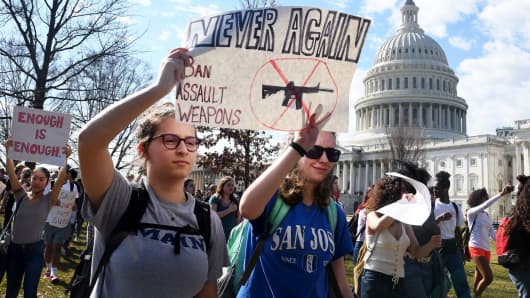Parkland, Florida. Another week, another school massacre. And, as the opponents of meaningful restrictions on the sale of guns and ammunition trot out their well-worn arguments for ignoring the bloodletting, another missed opportunity to call them on the enormous gap in the logic of their case.
We can repeat the arguments in our sleep. As President Donald Trump puts it, "We have a lot of mental health problems in our country ... [b]ut this isn't a guns situation."
As former Arkansas governor and Trump rival Mike Huckabee says, "When somebody has an intent to do incredible damage, they're going to find a way to do it."
And, according to Texas Attorney General Ken Paxton, "with the ability to carry [guns], there's always the opportunity that gunman will be taken out before he has the opportunity to kill very many people."
Whether gun control advocates wish to admit it or not, there's truth in each of these assertions. Well-adjusted individuals don't arm themselves to the teeth and go on shooting sprees. People set on doing others in can choose from among a variety of means to accomplish the task. An occasional gun-toting bystander may, by chance, be able to take out a mass shooter before the latter has finished. Indeed, it is by no means certain that gun control measures would have prevented any of the mass killings that have become the new normal.
Here, though, is the unseen fallacy employed by the Second Amendment fetishists. To constitute sound, life-preserving legislation, restrictions on the availability of guns and ammunition needn't prevent all gun-related carnage.
An analogy: knowing full well that murders will inevitably occur in a nation of 300 million people, we nonetheless adopt homicide laws and punish violators we manage to apprehend. If, instead, we were to reason — as gun control opponents would have us do with gun restrictions — that homicide laws are inappropriate since they are not perfect deterrents, we'd be stepping over dead bodies as we stroll down the sidewalk.
The best that homicide law or gun restrictions or any prohibition against harmful conduct can do is deter some of the people who would otherwise engage in the prohibited conduct. In fact, though, even a modest measure, like banning the semi-automatic attack rifles used in many of this decade's mass shootings, would, over time, save any number of innocent lives.
The gun lobby's emphasis of the imperfection of gun restrictions is an example of what in formal logic is called a "red herring" argument, in which the speaker's argument deflects attention from the issue at hand. In this case, the issue at hand is whether gun control measures are likely to save some — but not all — of the many lives now lost through gunfire, and the "red herring" is the assertion of the NRA and other opponents of restrictions that many lives will still be lost.
Though they hold truth, the tired arguments trotted out after mass murders like the one in Parkland to maintain the easy availability of attack weapons are pretexts to preserve the age-old accoutrement that makes men feel like men. Through a rhetorical sleight of hand, the incomplete prevention of gun deaths through tighter restrictions has become an argument to do nothing.
Whatever the fate of efforts to impose stiffer gun restrictions, it's time to pull the curtain back on the serious illogic of the gun-control opponents.
Commentary by Jay Sterling Silver, a law professor at St. Thomas University School of Law.
For more insight from CNBC contributors, follow @CNBCopinion on Twitter.


